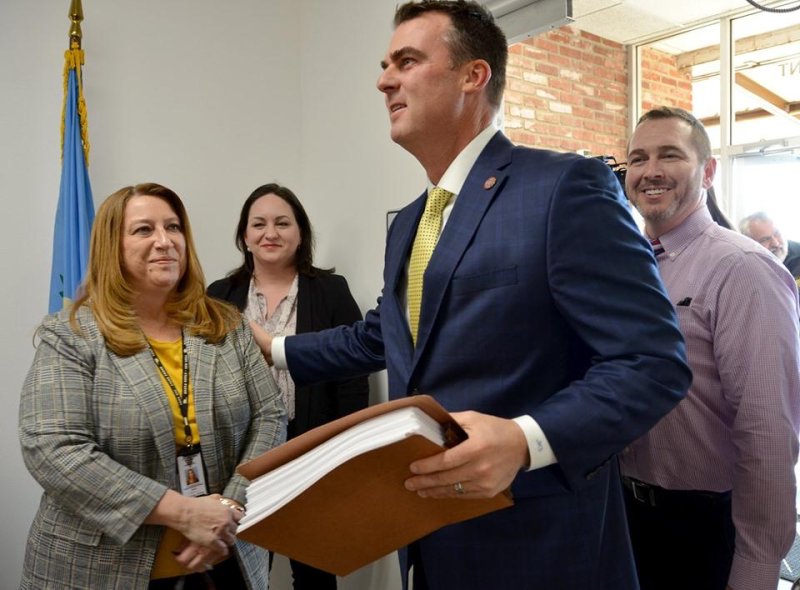Oklahoma Gov. Kevin Stitt delivered the signed commutations of sentence for over 450 state inmates on low-level crimes on Friday to the Oklahoma Department of Corrections. Photo courtesy of Oklahoma Department of Corrections/
Facebook
Nov. 4 (UPI) -- More than 450 Oklahoma inmates were released from prison on Monday as part of the nation's largest commutation of sentences, said Gov. Kevin Stitt.
The Oklahoma Pardon and Parole Board voted unanimously Friday to recommend the sentences of 527 inmates be commuted before giving them to Stitt for final approval who then delivered the commutations to the Oklahoma Department of Corrections for processing. Of the 527 inmates whose sentences were commuted, 462 were to be released Monday as 65 with detainers remained in custody.
During a news conference Monday that bordered on a celebration, Stitt told a group of released inmates that Oklahoma is rooting for them.
"We really want you to have a successful future and that's what I want to leave you with: this is the first day of the rest of your life," he said to cheers from the crowd.
The commutations follow Oklahoma citizens voting yes to a state question in 2016 to reclassify simple drug possession as a misdemeanor and increase felony property crimes form $500 to $1,000. Then earlier this year, Stitt signed House Bill 1269 to accelerate a single-stage commutation docket to review sentences of inmates in prison on crimes that were no longer felonies and applied the changes retroactively.
The move comes as Stitt has been fighting to reform the state's laws that, according to the Prison Policy Initiative, have made Oklahoma owner of the highest prison rate in the nation.
"This event is another mark on our historic timeline as we move the needle in criminal justice reform, and my administration remains committed to working with Oklahomans to pursue bold change that will offer our fellow citizens a second chance while also keeping our communities and streets safe," the Republican governor said.
Prior to the commutations, the state held its first-ever so-called transition fairs for inmates at 28 facilities to help prepare them for integration into society. More than 200 people from 45 community nonprofits and state agencies met with 781 inmates to connect them with necessary services to help prevent recidivism. Oklahoma also arranged for inmates to have valid state-issued identification prior to discharge.
"From day one, the goal of this project has been more than just the release of low-level, non-violent offenders, but the successful re-entry of these individuals back into society," Pardon and Parole Board Executive Director Steven Bickley said in a statement. "It has been a moving experience to see our state and community partners help connect our inmates with the resources they need for a successful re-entry."
Of the inmates whose sentences were commuted, 75 percent are male and 25 percent are female with their average age being 39. The inmates had also been incarcerated for an average of three years with almost a year-and-a-half left to their sentence.
By ending their sentences, the state commuted 1,931 years of incarceration, saving the state nearly $12 million that would have gone towards the inmates' captivity.
"This is a historical day for criminal justice reform in Oklahoma," Bickley said.















